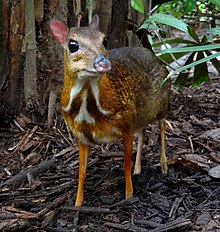Mouse deer
| Chevrotains Temporal range: Oligocene–Recent |
|
|---|---|
 |
|
| Tragulus kanchil | |
| Scientific classification | |
| Kingdom: | Animalia |
| Phylum: | Chordata |
| Class: | Mammalia |
| Order: | Artiodactyla |
| Infraorder: | Tragulina |
| Family: |
Tragulidae Milne-Edwards, 1864 |
| Genera | |
Chevrotains, also known as mouse-deer, are small ungulates that make up the family Tragulidae, the only members of the infraorder Tragulina. The ten extant species are in three genera, but several species also are known only from fossils. The extant species are found in forests in South and Southeast Asia, with a single species in the rainforests of Central and West Africa. They are solitary or live in pairs, and feed almost exclusively on plant material. Depending on exact species, the Asian species weigh between 0.7 and 8.0 kg (1.5 and 17.6 lb), and include the smallest ungulates in the world. The African chevrotain is considerably larger at 7–16 kg (15–35 lb).
Chevrotain is a French word that means "little goat".
The single African species is consistently known as "chevrotain". The names "chevrotain" and "mouse-deer" have been used interchangeably among the Asian species, though recent authorities typically have preferred chevrotain for the species in the genus Moschiola and mouse-deer for the species in the genus Tragulus. Consequently, all species with pale-spotted or -striped upper parts are known as "chevrotain" and without are known as "mouse-deer".
The Telugu name for the Indian spotted chevrotain is jarini pandi, which literally means "a deer and a pig". In Kannada, it is called barka (ಬರ್ಕ), in Malayalam, it is called khooran, and the Konkani name for it is barinka. The Tamil term is சருகு மான் sarukumāṉ "leaf-pile deer".
...
Wikipedia
